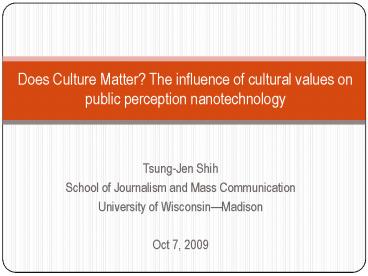TsungJen Shih PowerPoint PPT Presentation
1 / 27
Title: TsungJen Shih
1
Does Culture Matter? The influence of cultural
values on public perception nanotechnology
- Tsung-Jen Shih
- School of Journalism and Mass Communication
- University of WisconsinMadison
- Oct 7, 2009
2
Overview
- Researchers have paid attention to public opinion
- Current research Knowledge vs heuristics
- More attention should be dedicated to difference
at the national level - Why is it important?
- Integrated regulation
- Commercialization
- Cooperation and competition
3
This study
4
Methods
- 21 countries , with Hierarchical Linear Modeling
- Individual level
- US Survey, 2007
- Eurobarometer 64.3, 2005
- Country level
- Human development values-----------World Value
Survey - Cultural worldviews---------Hofstede Schwartz
value survey
5
- Many possibilities created by nanotech also, at
the same time, challenge peoples basic values
about life. - Many religious groups have criticized
nanotechnology for creating the potential for
human enhancement and even the creation of life - The role of religiosity, traditional value,
survival value
6
Cultural values
7
(No Transcript)
8
Predicting moral acceptability
Country level
9
- As cultural theory suggests, risk is selected.
- How a technology will develop depends on what
kind of society we want.
Hierarchy
Individualism
Collectivism
Egalitarianism
10
Perception of benefits risks
11
Predicting risk benefits
12
Estimated means
13
Discussion about benefits and risks
- Perceptual filters
- Religiosity and confidence affect the way people
interpret benefits and risks - Their effects vary with cultures (survival value
has an weakening effect on confidence) - Perception of benefits and risks also reflect
preferred ways of life
14
- Integrating the variables explored previously
- Two models
- Human development values
- Cultural worldviews
- Effects at the country level were not obvious
15
- Individual value predispositions, along with the
evaluation of core properties of nanotechnology,
are the most important determinants of public
opinion - The important role of values indicated that
people care more than the technology itself - However, the environment in which the individual
lives also matters as it provides the sources
from which peoples values originate - Aggregate values and worldviews affect both the
perception of nanotechnology and the effect of
individual-level variables
16
- Thank you!
17
(No Transcript)
18
(No Transcript)
19
- Why is confidence assumed to affect moral
acceptability - Scheufele et al (2008) suggested that moral
acceptability was associated with trust in
scientists at the individual level. As a type of
general trust, I therefore control confidence as
a potential mediator. - Although the causal direction b/w confidence and
moral acceptability is not clear, this study
showed that religiosity played a role at the
individual level even after confidence was
controlled.
20
- Does religious denomination really have no
effects? - The conclusion that the strength of religiosity
matters more than religious denomination was
based on country-level results. - The results suggested that religious denomination
did not explain the varied effects of religiosity
on moral acceptability found in different
cultures. They also did not affect moral
perception with respect to nanotechnology. - However, the effect of religious denomination at
the individual level is not clear.
21
HLM
- Analysis mostly based on HLM
- Violation of OLS assumption (independence)
- Taking into account aggregate and individual
level variables simultaneously - Allowing me to examine whether the effect of
individual-level predictors vary with cultures
22
US
23
Predicting support in the US
24
Comparison of US public opinion surveys in 2004
and 2007
25
Predicting benefits risks
- Why is cultural theory relevant? The definition
of risk pertains to a societys preferred
lifestyles and social relations - Individualism (vs collectivism)
- Egalitarianism (vs hierarchy)
- Religiosity and confidence as perceptual
filters
26
- No individual data regarding cultural worldviews
and values - Questions are too general
- benefits and risks
- regulations
- Not sure whether each construct has the same
meaning in different cultures
27
Predicting moral acceptability
- The association b/w religiosity and moral
acceptability - the influence at the individual level
- the influence at the aggregate level
- invariant association across cultures?
- The association b/w human development values and
moral acceptability

